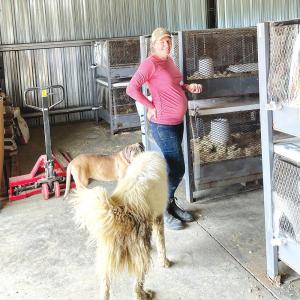2022 - Volume #46, Issue #5, Page #23
[ Sample Stories From This Issue | List of All Stories In This Issue | Print this story
| Read this issue]
Mobile Brooder Pens Save Time, Labor
 |
“I came up with the idea when starting Autonomy Farms,” says Bell. “I didn’t have extra labor, and it took too much time moving the chicks.”
Perhaps because Bell was new to farming and poultry, she was open to trying new ways.
“I started looking online, but couldn’t find anything to speed chick handling,” recalls Bell. “I started brainstorming with a welder I knew, and we came up with the pen. I tried one for 2 mos., made some changes, and built more. Now I use them for every batch I raise.”
Each 4 by 8-ft. bed has access doors on the ends and the front side. There’s a fourth access door at the bottom of the box. The sides are expanded metal with 1 1/2-in. wide holes. The framing is 1 by 1-in. aluminum tubing. Pens are stacked two high with forklift receiver tubing (1 by 4) attached to the underside of the lower pen.
A heavy plastic tray lines the bottom of the pens, which sits about 8 in. off the floor. New chicks are greeted with a layer of wood chips, fresh water and feed.
When the weather cools, Bell adds 1-in. foam panels to the top of each pen and covers the stacked pens with a layer of 80 mil marine vinyl to hold in the heat.
“Our temperatures can get down to 26 to 28 degrees,” says Bell. “In the warmer seasons, chicks spend about two weeks in the pens, shifting to about three weeks in the winter.”
When the chicks are ready for pasture, moving is fast and easy. Bell uses a fork-equipped loader to pick up each stack and deposit it at the door of a moveable pasture pen. She opens the doors and pushes the chicks down a ramp, through the door and onto the grass.
“It’s an easy way to move the chicks and to clean out the pens,” says Bell. “We drop the bottom door of the pen, remove the tray and let the chips and manure drop onto the field where they decompose.”
Cleanup is even easier. Bell uses a power washer on the pens, lubricates the hinges and sets them aside for the next batch.
“It takes me just 2 hrs. to move 1,200 birds onto pasture and clean and disinfect the brooders and plastic.”
Bell raises and markets chicken, eggs, lamb, beef, hogs and turkeys, all pasture raised. She makes deliveries to CSA and bulk order customers in Los Angeles.
Contact: FARM SHOW Followup, Autonomy Farms, 21600 Adobe Rd. Bakersfield, Calif. 93307 (ph 661-430-0106; info@autonomyfarms.com; www.autonomyfarms.com).

Click here to download page story appeared in.

Click here to read entire issue
To read the rest of this story, download this issue below or click here to register with your account number.




